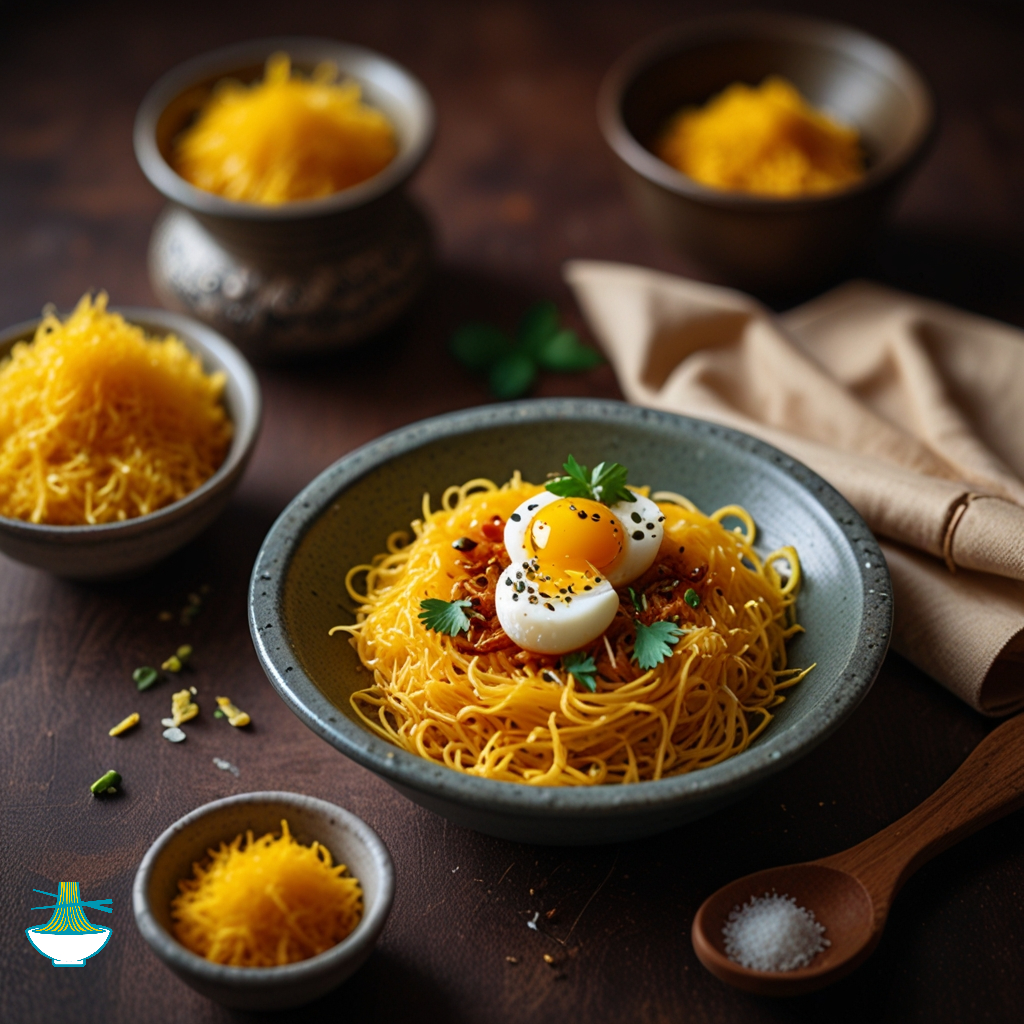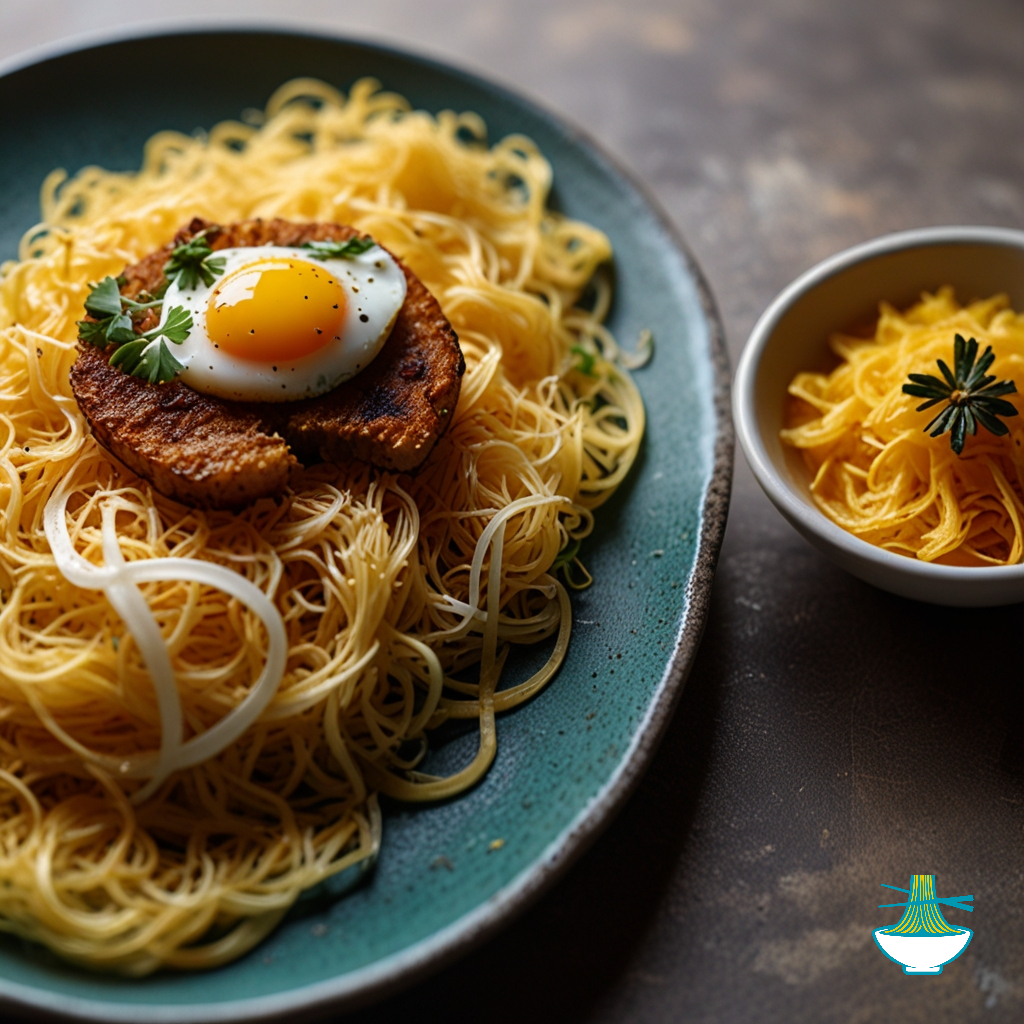Balaleet is a traditional Emirati breakfast dish featuring vermicelli noodles cooked with eggs, sugar, cardamom, and saffron. Its origins trace back to Emirati culinary heritage, reflecting the influence of Arabian flavors and spices. This sweet and savory delicacy is cherished for its unique taste and cultural significance, making it a beloved dish in the United Arab Emirates and beyond.
Ingredients:
- 200g vermicelli noodles
- 4 eggs
- 4 tablespoons sugar
- 1/2 teaspoon ground cardamom
- A pinch of saffron threads
- 2 tablespoons butter
Method:
1. Cook vermicelli noodles according to package instructions until al dente. Drain and set aside.
2. In a bowl, whisk together eggs, sugar, ground cardamom, and saffron.
3. In a large skillet, melt butter over medium heat. Add cooked vermicelli noodles and spread them evenly.
4. Pour the egg mixture over the noodles, spreading it evenly.
5. Cook until the eggs are set and the bottom is golden brown, about 5-7 minutes.
6. Using a spatula, gently flip the balaleet to cook the other side until golden brown.
7. Serve hot and enjoy this delightful Emirati breakfast!
Nutrition Value:
1. 200g vermicelli noodles:
- Calories: Approximately 720 kcal
- Carbohydrates: Around 144 grams
- Protein: Roughly 20 grams
- Fat: Minimal, usually less than 2 grams
- Sodium: Varies, usually less than 10 milligrams
- Cholesterol: Typically 0 milligrams
- Vitamins and Minerals: Contains small amounts of iron, thiamine (B1), riboflavin (B2), niacin (B3), and folate.
- Nutritional Benefit: Vermicelli noodles provide energy from carbohydrates and some protein. They are low in fat and cholesterol, making them a good option for those watching their fat intake.
2. 4 eggs:
- Calories: Approximately 280 kcal
- Carbohydrates: Less than 2 grams
- Protein: About 24 grams
- Fat: Around 20 grams
- Sodium: Roughly 280 milligrams
- Cholesterol: Approximately 960 milligrams
- Vitamins and Minerals: High in vitamin B12, vitamin D, riboflavin, and selenium. Also contain significant amounts of vitamins A, E, K, B6, calcium, and zinc.
- Nutritional Benefit: Eggs are an excellent source of high-quality protein and essential nutrients like vitamin B12 and selenium. They also provide healthy fats and vitamins necessary for various bodily functions.
3. 4 tablespoons sugar:
- Calories: Around 200 kcal
- Carbohydrates: Approximately 50 grams
- Protein: 0 grams
- Fat: 0 grams
- Sodium: 0 milligrams
- Cholesterol: 0 milligrams
- Nutritional Benefit: Sugar provides a quick source of energy due to its high carbohydrate content. However, it lacks essential nutrients and can contribute to health issues like obesity and diabetes if consumed in excess.
4. 1/2 teaspoon ground cardamom:
- Calories: Approximately 6 kcal
- Carbohydrates: Around 1.5 grams
- Protein: 0.2 grams
- Fat: 0.1 grams
- Sodium: Less than 1 milligram
- Cholesterol: 0 milligrams
- Vitamins and Minerals: Contains small amounts of calcium, magnesium, and potassium.
- Nutritional Benefit: Cardamom is rich in antioxidants and may have anti-inflammatory properties. It adds flavor to dishes without significant calories, making it a healthy spice choice.
5. A pinch of saffron threads:
- Calories: Approximately 0 kcal
- Carbohydrates: Less than 1 gram
- Protein: Less than 1 gram
- Fat: Less than 1 gram
- Sodium: Less than 1 milligram
- Cholesterol: 0 milligrams
- Nutritional Benefit: Saffron is prized for its unique flavor and aroma. While it doesn't provide significant macronutrients, it contains compounds like crocin and safranal, which may have antioxidant and mood-enhancing properties.
6. 2 tablespoons butter:
- Calories: Approximately 200 kcal
- Carbohydrates: 0 grams
- Protein: 0.2 grams
- Fat: Around 22 grams
- Sodium: Around 180 milligrams
- Cholesterol: Around 60 milligrams
- Vitamins and Minerals: Contains vitamin A and small amounts of vitamin D, vitamin E, vitamin K, and calcium.
- Nutritional Benefit: Butter is a concentrated source of calories and fat. While it provides essential fat-soluble vitamins, it should be consumed in moderation due to its high saturated fat content, which may increase the risk of heart disease when consumed in excess.


Comments